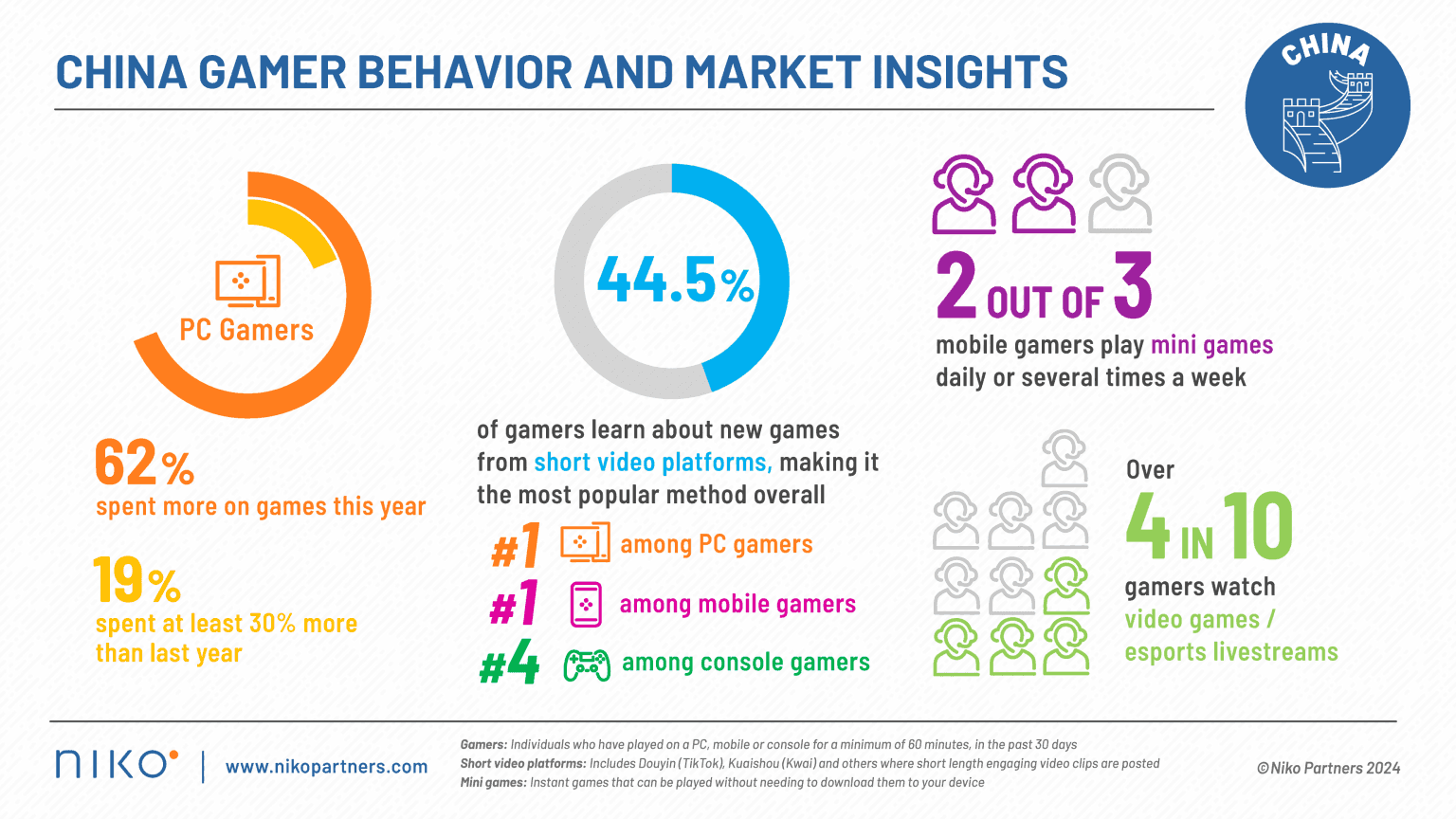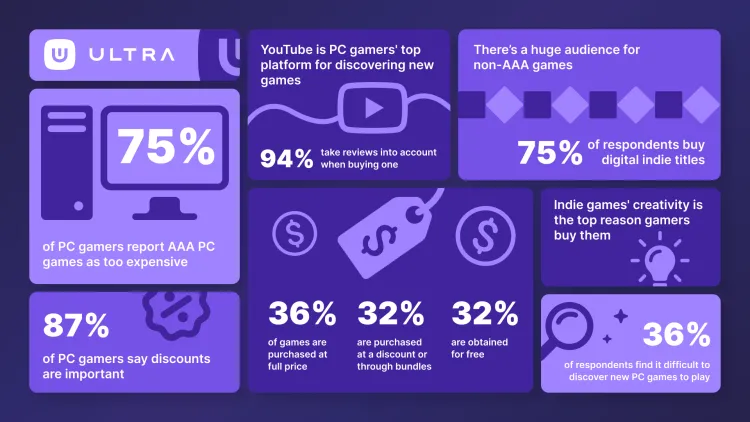PC gaming has been a foundational part of the video game industry since its inception. Some of the earliest video games, such as Bertie the Brain (1950), The Nimrod (1951), and OXO (1952), were developed on custom-built computers before personal computers became widely available. The emergence of home computers in the late 1970s, including models like the Apple II and Commodore PET, helped establish PC gaming as a mainstream form of entertainment.
PC Gaming Market Has Grown Over $30 Billion Since 2011
Today, PC gaming remains a dominant force, with approximately 1.9 billion players worldwide. The market continues to grow steadily, with a consistent annual increase of around 3%. In 2024, consumer spending on PC gaming, including digital and physical game purchases, in-game transactions, and subscription services, reached $41.5 billion, reflecting a 6.9% year-over-year increase.
Despite this steady expansion, the industry faces notable challenges. Overall gaming hours have declined since the peak usage period during the COVID-19 pandemic. Between the first quarter of 2021 and the third quarter of 2024, total gaming time decreased by 32%, while PC gaming playtime specifically declined by 21%. This shift indicates evolving player habits and highlights some of the difficulties facing the PC gaming industry today.

PC Gaming Growth Worldwide
Factors Impacting PC Gaming Growth
While PC gaming has maintained a steady increase in user numbers over the past decade, several factors are slowing the pace of growth. The rising capabilities of gaming consoles, global supply chain dependencies, and emerging technologies such as cloud gaming present challenges for the long-term expansion of the PC gaming market.
Gaming consoles have traditionally offered a more straightforward, plug-and-play experience compared to PCs, which often require hardware modifications and upgrades. While PCs have historically held an advantage in terms of processing power and graphical capabilities, the latest console models have significantly narrowed this gap. The PlayStation 5 Pro, for instance, features performance comparable to an NVIDIA RTX 4070, while the Xbox Series X has hardware equivalent to an NVIDIA RTX 3060 Ti. Additionally, gaming subscription services such as Xbox Game Pass and PlayStation Plus provide a streamlined way for players to access a wide variety of games, reducing the need for high-end PC hardware.

Global Unit Sales (Millions)
Supply Chain Challenges and Cloud Gaming
Beyond technological competition, supply chain challenges have also impacted the PC gaming market. The global gaming GPU market reached $5.5 billion in 2024, with the United States accounting for nearly one-third of this figure. Recent increases in tariffs on Chinese imports, rising from 10% to 20%, have contributed to higher GPU prices. Although semiconductor manufacturing often occurs in regions such as Taiwan and South Korea, many components are still sourced or assembled in China. Major retailers, including Newegg, Best Buy, and Target, have already reported price increases of $100 to $400 on GPUs, making it more expensive for consumers to invest in high-end PC gaming setups. This could deter new players from entering the market or lead existing users to delay hardware upgrades.
Additionally, cloud gaming is creating new opportunities for players to access high-quality games without the need for expensive hardware. Services like GeForce NOW and Microsoft’s cloud gaming infrastructure are removing the necessity of high-end GPUs, allowing gamers to experience premium titles through remote servers. Microsoft has indicated that a significant portion of its Xbox Game Pass growth is coming from cloud-first users rather than those with dedicated PC or console hardware. While this shift may lower the financial burden for players, it could also reduce demand for gaming PC hardware, particularly among more casual gamers.

Powerful GPU Compute Solutions On-Demand
The Strengths of PC Gaming Amid Challenges
Despite these challenges, PC gaming continues to demonstrate resilience. One of its strongest advantages is its capacity for customization and user-generated content. Unlike gaming consoles, PCs allow for modifications that enhance and personalize gameplay. Games such as Minecraft, Skyrim, Baldur’s Gate 3, and Fallout 4 have thriving modding communities, and in 2024, annual mod downloads exceeded 30 billion. With the upcoming release of Grand Theft Auto VI, a game expected to have extensive modding potential, user-generated content is likely to remain a significant factor in PC gaming’s appeal.
PC hardware is also designed with longevity in mind. Unlike consoles, which require users to purchase entirely new devices to upgrade performance, gaming PCs can be improved over time by upgrading specific components such as graphics cards, processors, or storage. Additionally, PC gamers have access to a wider range of peripherals, including gaming-specific keyboards, mice, monitors, and headsets, allowing for further customization of their gaming experience.
Another key factor contributing to PC gaming’s resilience is its deep integration with social and streaming platforms. Many gamers use applications such as Discord, Twitch, and YouTube while playing, creating an interactive and community-driven environment. While console users must rely on separate devices to access these platforms, PC gamers can seamlessly run them in the background. This ease of integration makes PC gaming a more socially connected experience, further solidifying its appeal.

Most Successful Game Launches on Live Streaming
The Role of Developers and Global Expansion
Game developers continue to prioritize PC as a platform due to its extensive distribution opportunities and established content libraries. Over the past several years, major gaming companies such as Sony and Microsoft have moved away from hardware-exclusive releases, making their games more widely available on PC. Platforms such as Steam provide strong content discovery mechanisms, and development engines like Unity allow for cross-platform game releases with minimal additional effort.
Beyond English-speaking regions, PC gaming is expanding in global markets. While Xbox has struggled to gain significant traction in Asia and Europe, PC gaming has seen notable growth in non-English-speaking countries. For example, Steam’s monthly active user count has increased significantly in China, indicating a growing international player base. However, it is worth noting that only about 20% of China’s domestic gaming expenditures go toward foreign game titles.

Steam's Consolidation of the PC Gamers
The Future of PC Gaming
Although the PC gaming market faces significant obstacles, it remains well-positioned to adapt to changing industry conditions. While technological advancements such as cloud gaming and high-performance consoles are reshaping the gaming landscape, PC gaming’s flexibility, extensive customization options, and social connectivity continue to provide advantages that appeal to a broad player base.
The increasing development of secondary markets for PC hardware, including platforms such as NZXT and Jawa, may also help mitigate some of the financial challenges associated with rising component prices. These marketplaces allow gamers to purchase pre-assembled PCs or used hardware, making it easier for new players to enter the market without incurring high costs. Additionally, companies such as Nvidia and AMD have been adjusting their supply chains in response to tariffs, potentially stabilizing inventory levels over time.
Despite ongoing challenges, the PC gaming industry remains a key segment of the gaming market. With an estimated $50 billion in hardware value and continuous software revenue growth, the industry’s resilience is supported by its global expansion, developer incentives, and the demand for a socially integrated gaming experience. While technological and economic shifts will influence its trajectory, PC gaming is likely to remain a significant and evolving part of the broader gaming landscape.
Source: Konvoy



